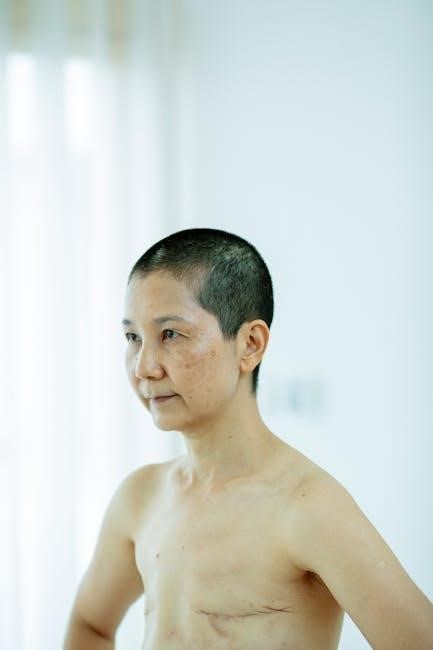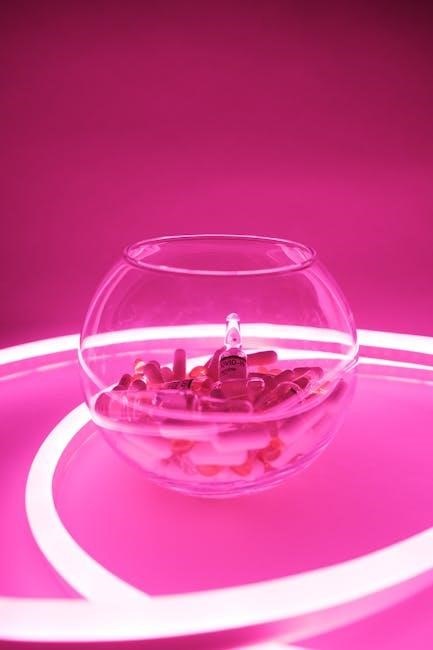Guiding Light Recovery is an intensive addiction rehab program offering men structure and the opportunity for change through empowerment and support, fostering a better future.
1.1. Definition and Overview
Guiding Light Recovery is an intensive addiction rehabilitation program designed to provide men with a structured environment to overcome addiction. It focuses on empowering individuals through evidence-based therapies, counseling, and peer support. The program aims to address the physical, emotional, and psychological aspects of addiction, offering a holistic approach to recovery. By combining personalized treatment plans with a supportive community, Guiding Light Recovery helps individuals achieve long-term sobriety and personal growth. The program emphasizes the importance of mindset transformation, equipping participants with tools to navigate challenges and maintain a healthy lifestyle post-rehab. Its comprehensive approach ensures a seamless transition from recovery to independent living, fostering resilience and hope for the future.
1.2. Importance of Recovery in Modern Society
Recovery plays a vital role in modern society by addressing the growing challenges of mental health and substance abuse. With increasing stress, accessibility of substances, and societal pressures, effective recovery programs are essential to help individuals rebuild their lives. Guiding Light Recovery, as an intensive rehab program, highlights the need for structured support systems to combat addiction. By enabling individuals to overcome addiction, recovery contributes to reducing crime rates, improving workplace productivity, and fostering healthier communities. It also helps break the stigma surrounding addiction, encouraging more people to seek help. Ultimately, recovery programs like Guiding Light Recovery promote societal well-being by empowering individuals to lead fulfilling, contributing lives, benefiting both the individual and the community at large.
1.3. The Unique Approach of Guiding Light Recovery
Guiding Light Recovery stands out with its holistic, evidence-based approach to addiction treatment. By combining mindfulness practices, cognitive-behavioral techniques, and community support, the program addresses the root causes of addiction. Its intensive structure provides men with the tools to redefine their lives, focusing on personal growth and long-term sobriety. The program emphasizes empowerment, offering a safe environment for individuals to confront their challenges and develop resilience. This blend of proven methodologies and a supportive community creates a unique path to recovery, setting it apart from traditional rehab models. The program’s commitment to individualized care ensures each participant receives tailored support, fostering a higher likelihood of sustained recovery and a positive reintegration into society.

The Concept of Guiding Light Recovery
Guiding Light Recovery is a structured addiction rehab program designed to empower individuals through evidence-based practices, mindfulness, and community support, fostering personal growth and lasting change.
2.1. Historical Background and Development
Guiding Light Recovery emerged as a response to the growing need for effective addiction treatment. Founded on principles of mindfulness and cognitive-behavioral techniques, the program emphasizes a holistic approach to recovery. Over the years, it has evolved to incorporate evidence-based practices, ensuring a comprehensive and adaptable treatment model. The program’s development was influenced by the integration of neuroscience and psychological research, focusing on neuroplasticity and behavioral change. By combining individualized care with group therapy and peer support, Guiding Light Recovery has established itself as a transformative resource for those seeking lasting sobriety and personal growth.
2.2. Core Principles and Philosophy
Guiding Light Recovery is rooted in the belief that sustainable change arises from empowerment and self-awareness. Its core philosophy emphasizes personal responsibility, mindfulness, and cognitive transformation. The program fosters a supportive environment where individuals can confront underlying issues and develop healthier coping mechanisms. By integrating evidence-based practices with holistic approaches, Guiding Light Recovery addresses the physical, emotional, and mental dimensions of addiction. The philosophy revolves around creating a foundation for long-term sobriety through structured routines, personalized growth plans, and a focus on relapse prevention. This approach ensures that participants gain the tools and resilience needed to navigate life’s challenges with confidence and clarity.
2.3. Key Components of the Program
Guiding Light Recovery combines evidence-based therapies with holistic practices to create a comprehensive approach. Key components include mindfulness meditation to enhance self-awareness, cognitive-behavioral therapy (CBT) to reframe thoughts and behaviors, and group therapy for peer support. The program also incorporates physical health activities, such as exercise and nutrition planning, to promote overall well-being. Structured daily routines provide stability, while personalized treatment plans ensure each participant’s unique needs are addressed. Relapse prevention strategies and aftercare services further support long-term recovery. This multifaceted approach equips individuals with the tools and resilience needed to achieve and maintain sobriety, fostering a balanced and fulfilling life beyond addiction.
The Science Behind Guiding Light Recovery
Guiding Light Recovery leverages neuroplasticity and evidence-based therapies to promote lasting change, enhancing brain function and emotional resilience through scientifically grounded methods.
3.1. Neuroplasticity and Behavioral Change
Guiding Light Recovery utilizes the concept of neuroplasticity, the brain’s ability to reorganize itself, to facilitate lasting behavioral change. By targeting areas affected by addiction, the program employs tailored exercises and therapies to rewiring the brain, fostering healthier thought patterns and coping mechanisms. This approach is grounded in scientific evidence, demonstrating how repetitive practices can lead to positive, long-term neurological adaptations. Participants engage in activities designed to strengthen neural pathways associated with self-control and emotional regulation, ultimately reducing relapse risks. The program’s focus on neuroplasticity ensures a comprehensive and sustainable path to recovery, empowering individuals to overcome addiction and build resilient brain structures for a brighter future.
3.2. The Role of Mindfulness in Recovery
Mindfulness plays a pivotal role in Guiding Light Recovery by helping individuals develop present-moment awareness, reducing stress, and enhancing emotional regulation. Through practices like meditation and mindful breathing, participants learn to observe their thoughts without judgment, breaking the cycle of reactive behaviors. This non-judgmental awareness fosters self-compassion and clarity, crucial for addressing underlying causes of addiction. Regular mindfulness exercises strengthen neural pathways linked to impulse control, enabling individuals to make conscious decisions aligned with their recovery goals. By integrating mindfulness into daily routines, the program equips participants with tools to manage cravings and emotional triggers effectively, promoting long-term sobriety and overall well-being.
3.3. Cognitive-Behavioral Techniques in Practice
Cognitive-Behavioral Techniques (CBT) are a cornerstone of Guiding Light Recovery, helping individuals identify and challenge negative thought patterns that contribute to addictive behaviors. By focusing on the interplay between thoughts, feelings, and actions, participants learn to recognize triggers and develop healthier coping mechanisms. Practical exercises, such as journaling and role-playing, enable individuals to practice new ways of thinking and reacting in real-life scenarios. This approach empowers participants to reframe unhelpful beliefs and replace them with positive, constructive ones, leading to improved emotional regulation and decision-making. CBT’s structured, evidence-based methods provide a clear roadmap for addressing addiction, fostering resilience, and preventing relapse.
Benefits of Guiding Light Recovery
Guiding Light Recovery offers emotional healing, mental clarity, and improved physical health, empowering individuals to achieve long-term sobriety and a balanced, fulfilling lifestyle.
4.1. Emotional Healing and Stability
Guiding Light Recovery emphasizes emotional healing and stability, helping individuals address underlying issues that contribute to addiction. Through mindfulness and cognitive-behavioral techniques, participants gain self-awareness and coping strategies to manage emotions effectively. The program fosters a supportive environment where individuals can process trauma and build resilience, leading to long-term emotional well-being. By focusing on personal growth and empowerment, Guiding Light Recovery equips individuals with the tools to maintain emotional stability, reducing the risk of relapse and promoting a healthier, more balanced lifestyle.
4.2. Mental Clarity and Focus
Guiding Light Recovery helps individuals achieve mental clarity and focus by addressing the cognitive distortions often associated with addiction. Through structured daily routines and evidence-based therapies like Cognitive-Behavioral Therapy (CBT), participants develop better problem-solving skills and improved concentration. Mindfulness practices further enhance mental clarity, allowing individuals to stay present and make rational decisions. The program’s emphasis on personal growth and accountability fosters a sense of purpose, helping individuals regain control over their thoughts and actions. By improving mental focus, Guiding Light Recovery empowers individuals to set and achieve long-term goals, leading to a more fulfilling and purpose-driven life.
4.3. Physical Health Improvement
Guiding Light Recovery emphasizes the importance of physical health as a cornerstone of overall well-being. The program incorporates holistic approaches, such as fitness routines, balanced nutrition, and adequate sleep, to address the physical toll of addiction. By fostering healthy habits, participants experience improved energy levels, enhanced physical strength, and better mental clarity. The program also educates individuals on the interconnectedness of physical and mental health, empowering them to adopt sustainable lifestyle changes. Through structured activities and professional guidance, Guiding Light Recovery helps individuals rebuild their physical health, creating a strong foundation for long-term recovery and a healthier, more balanced life.

The Recovery Process
The recovery process at Guiding Light Recovery begins with a comprehensive assessment, leading to personalized treatment plans, structured daily routines, and robust aftercare support for lasting change.
5.1. Initial Assessment and Diagnosis
The initial assessment at Guiding Light Recovery is a comprehensive process to evaluate an individual’s unique needs. Professionals review medical history, mental health, and substance use patterns to create a clear diagnosis. This step ensures personalized care by identifying underlying issues and setting realistic goals. The assessment also considers lifestyle factors and personal circumstances to tailor the treatment plan effectively. By understanding the root causes of addiction, the program can address physical, emotional, and psychological aspects. This thorough evaluation sets the foundation for a structured and supportive recovery journey, ensuring each client receives the specific tools and strategies needed for lasting change and growth.
5.2. Personalized Treatment Plans
Guiding Light Recovery crafts tailored treatment plans to address each individual’s unique challenges and goals. Following the initial assessment, experts design a structured program that integrates evidence-based therapies, support groups, and lifestyle adjustments. These plans are flexible, adapting to progress and evolving needs. They focus on addressing addiction, mental health, and physical well-being holistically. By prioritizing personalization, the program ensures that clients receive targeted strategies to overcome specific obstacles. This customized approach fosters a supportive environment, empowering individuals to take ownership of their recovery journey and achieve sustainable growth. The goal is to equip clients with the tools and resilience needed for long-term success and well-being.
5.3. Daily Routine and Structure
The daily routine at Guiding Light Recovery is designed to provide structure and stability, essential for the recovery process. Each day is carefully planned to balance therapy sessions, group activities, and personal reflection time. Morning sessions often include mindfulness practices and goal-setting exercises, while afternoons focus on intensive therapy and skill-building workshops. Evenings are reserved for peer support groups and relaxing activities to promote mental and emotional rejuvenation. This structured schedule helps individuals establish healthy habits, accountability, and a sense of purpose. The consistent routine ensures that clients stay focused on their recovery goals, fostering a environment of growth and transformation. Structure is key to rebuilding lives and achieving lasting sobriety.
5.4. Aftercare and Relapse Prevention
Aftercare and relapse prevention are critical components of the Guiding Light Recovery program. Once participants complete the initial treatment, they are equipped with tools and strategies to maintain sobriety in their daily lives. The program offers ongoing support through counseling, group therapy, and access to resources that help graduates navigate challenges post-treatment. Personalized aftercare plans are developed to address individual needs, ensuring a smooth transition back to independent living. Relapse prevention techniques, such as identifying triggers and developing coping mechanisms, are emphasized to help individuals avoid setbacks. The goal is to provide a strong foundation for lasting recovery, empowering individuals to lead fulfilling lives free from addiction.
Tools and Techniques Used in Guiding Light Recovery
Guiding Light Recovery employs mindfulness, CBT, and group therapy to foster lasting change, offering structured support for individuals overcoming addiction through evidence-based practices daily.
6.1. Mindfulness Meditation Practices
Mindfulness meditation is a cornerstone of Guiding Light Recovery, helping individuals cultivate present-moment awareness to manage cravings and emotional triggers effectively; By focusing on breath and body sensations, participants develop self-regulation skills, reducing stress and anxiety. Regular practice enhances emotional resilience, fostering a calmer and more centered mindset. Guided sessions are tailored to address addiction-specific challenges, promoting self-compassion and clarity. This practice not only supports mental healing but also improves physical well-being, aiding in overall recovery. Mindfulness meditation empowers individuals to navigate life’s difficulties with greater ease, laying a strong foundation for long-term sobriety and personal growth.
6.2. Cognitive-Behavioral Therapy (CBT)
Cognitive-Behavioral Therapy (CBT) is a key component of Guiding Light Recovery, focusing on identifying and changing negative thought patterns and behaviors that contribute to addiction. By understanding the connection between thoughts, feelings, and actions, individuals learn to challenge and reframe harmful beliefs. Practical techniques such as journaling, role-playing, and cognitive restructuring are used to develop healthier coping strategies. CBT empowers clients to recognize triggers and develop skills to manage them effectively, reducing the risk of relapse. This evidence-based approach helps individuals gain control over their emotions and behaviors, fostering long-term recovery and personal growth. Through CBT, participants build resilience and develop a mindset that supports sustained sobriety and a fulfilling life.
6.3. Group Therapy and Peer Support
Group therapy and peer support are integral to Guiding Light Recovery, fostering camaraderie and shared understanding among participants. These sessions provide a safe space for individuals to share experiences, challenges, and successes, fostering empathy and connection. Led by trained professionals, group therapy encourages open dialogue and collaborative problem-solving, helping participants gain new perspectives on their recovery journey. Peer support strengthens accountability and motivation, as individuals inspire and uplift one another. Structured activities and discussions focus on building life skills, managing emotions, and maintaining sobriety. This collective approach reduces feelings of isolation and reinforces the idea that recovery is a shared endeavor. By leveraging the power of community, group therapy and peer support empower individuals to grow and thrive together, creating lasting bonds that extend beyond the program.

Success Stories and Testimonials
Guiding Light Recovery shares inspiring success stories and heartfelt testimonials from program graduates, highlighting real-life recoveries and the transformative impact of its structured, supportive approach to addiction recovery.
7.1. Real-Life Examples of Recovery
Guiding Light Recovery showcases real-life examples of individuals overcoming addiction through its structured program. These stories highlight personal growth, resilience, and the transformative power of the program’s supportive environment. Graduates often share how the program’s intensive approach helped them rebuild their lives, regain control, and achieve long-term sobriety. Their journeys illustrate the effectiveness of the program’s holistic methods, blending therapy, mindfulness, and community support. These testimonials serve as inspiration for those considering the program, demonstrating that recovery is not only possible but also sustainable with the right guidance and determination.
7.2. Testimonials from Program Graduates
Graduates of Guiding Light Recovery often express profound gratitude for the program’s life-changing impact. Many share stories of transformation, emphasizing how the program’s structured approach and supportive community helped them achieve sobriety and rebuild their lives. One graduate noted, “Guiding Light Recovery gave me the tools and confidence to overcome addiction and reclaim my future.” Another highlighted the program’s holistic methods, saying, “The combination of therapy, mindfulness, and peer support was instrumental in my healing journey.” These testimonials underscore the program’s effectiveness in fostering resilience and lasting change, inspiring others to seek help and embrace the possibility of recovery.

Addressing Challenges in Recovery
Recovery often involves overcoming relapse triggers, emotional struggles, and lifestyle adjustments. Guiding Light Recovery provides strategies to navigate these challenges, ensuring a supportive path toward lasting sobriety.
8.1. Common Obstacles in the Recovery Journey
In the recovery journey, individuals often face relapse triggers, emotional instability, and social pressures. Financial stress, relationship issues, and unresolved trauma can also hinder progress. Additionally, adjusting to a new lifestyle without substances presents challenges, as does rebuilding trust and self-esteem. These obstacles require tailored strategies and support to overcome, ensuring a sustainable path toward healing and growth. Guiding Light Recovery addresses these challenges through comprehensive resources and guidance, helping participants navigate their unique recovery landscape effectively. By understanding and tackling these common obstacles, individuals can strengthen their commitment to long-term sobriety and personal well-being. This approach fosters resilience and prepares participants for real-world scenarios post-recovery.
8.2. Strategies for Overcoming Setbacks
Overcoming setbacks in recovery requires resilience, adaptability, and proactive strategies. Mindfulness practices help individuals stay present and manage cravings. Cognitive-behavioral techniques enable them to identify and challenge negative thought patterns. Seeking support from peers, mentors, or professionals can provide encouragement and guidance. Setting realistic goals and celebrating small milestones helps maintain motivation. Engaging in physical activities and healthy habits promotes overall well-being. Building a robust support network and leveraging aftercare programs are crucial for sustained recovery. By addressing triggers and developing coping mechanisms, individuals can navigate challenges effectively. Guiding Light Recovery emphasizes these strategies to empower participants with tools for long-term success and relapse prevention, fostering a resilient mindset for overcoming obstacles.

The Role of Community in Recovery
Community plays a vital role in recovery by fostering connections, understanding, and mutual support, helping individuals stay accountable and motivated throughout their journey.
9.1. Importance of Support Groups
Support groups are crucial in recovery as they provide a shared space for individuals to connect, share experiences, and gain mutual encouragement. These groups reduce feelings of isolation, fostering a sense of belonging and understanding. Through collective support, individuals can openly discuss challenges and successes, receiving valuable feedback and advice. Support groups also promote accountability, helping participants stay committed to their recovery journey. The shared experiences and camaraderie within these groups empower individuals to overcome setbacks and celebrate milestones. This collective strength is essential for long-term recovery, offering a network of encouragement and guidance.
9.2. Building a Strong Support Network
Building a strong support network is essential for lasting recovery. It involves identifying key individuals who can provide emotional, practical, and motivational support. Open communication is vital, allowing individuals to share their struggles and victories without fear of judgment. Setting boundaries within these relationships ensures healthy dynamics and mutual respect. Family and friends play a significant role, but peer support from others in recovery can offer unique understanding. Engaging with community groups and mentors further enriches the network. Regular interaction with supporters helps maintain accountability and motivation. A robust support network not only aids in overcoming challenges but also celebrates successes, fostering resilience and confidence in the recovery journey.
Guiding Light Recovery offers a transformative journey, empowering individuals with tools for lasting change and fostering a brighter, healthier future through compassion and support.
10.1. Final Thoughts on Guiding Light Recovery
Guiding Light Recovery stands out as a beacon of hope, offering a comprehensive and compassionate approach to addiction recovery. By integrating proven techniques like mindfulness and cognitive-behavioral therapy, the program addresses the root causes of addiction, fostering emotional healing and mental clarity. Participants benefit from personalized treatment plans, a structured daily routine, and robust aftercare support, ensuring a sustainable path to sobriety. The program’s emphasis on community and peer support creates a nurturing environment where individuals can build resilience and confidence. Ultimately, Guiding Light Recovery not only helps individuals overcome addiction but also equips them with the tools to lead fulfilling, purpose-driven lives.
10.2. Encouragement for Those Considering the Program
If you or someone you know is struggling with addiction, Guiding Light Recovery offers a lifeline to transformation. Taking the first step toward recovery is courageous, and this program provides the tools and support to guide you through the process. With a focus on personal growth, mindfulness, and community support, Guiding Light Recovery creates a safe and empowering environment for healing. Don’t hesitate to embrace this opportunity for a brighter, healthier future. The program’s compassionate approach and proven techniques can help you overcome challenges and build a strong foundation for long-term sobriety. Take the leap toward a life filled with purpose and fulfillment.



